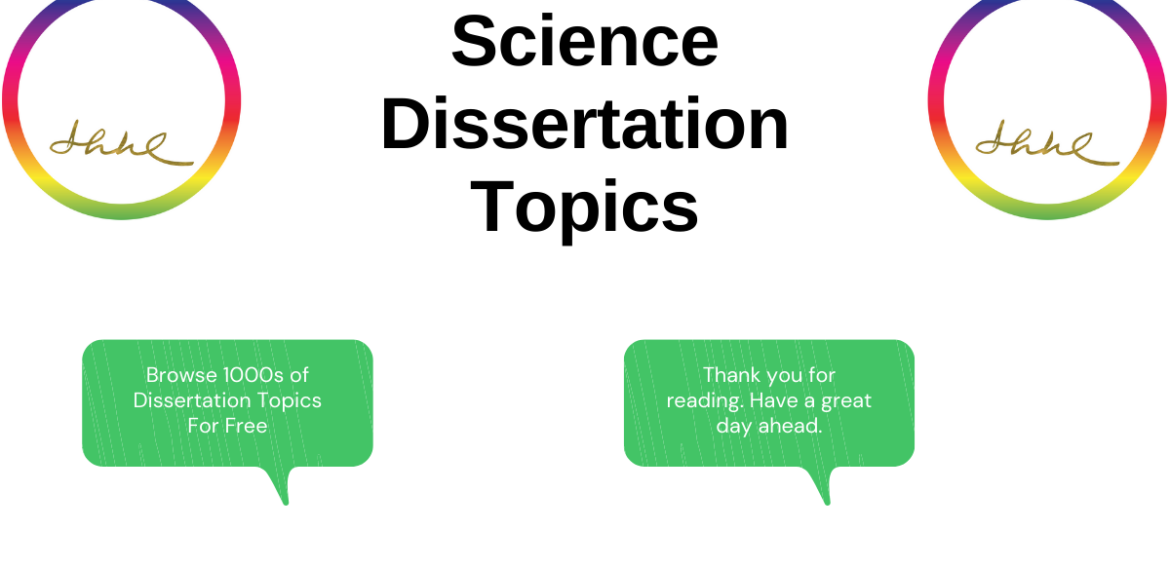Science Dissertation Topics
The purpose of a dissertation is to recognise and derive relevant knowledge that can be beneficial in a variety of ways. Understanding the difficulties and identifying disease-causing molecular components is feasible with a survey of literature in Biomedical Science and related domains. We’ve created a list of probable science dissertation topics in the areas of disease and pharmacology. We’ve also given proposals for veterinary medicine, nanotechnology and forensic science.
Editingarsenal has compiled a list of some of the most popular and common dissertation topics from a variety of academic disciplines, so you can pick and choose what to write about. If you need dissertation editing assistance , don’t hesitate to contact one of our qualified and experienced editors and proofreaders.
Disease and Pathogen
- A greater understanding of diseases and the microbes that cause them can result in improved therapy techniques. The study of these subjects is critical for the animal kingdom as a whole. This type of dissertation may benefit the field of biomedicine while also being widely read.
- Colorectal cancer is the third most prevalent type of cancer in the United Kingdom. What are the risk factors and how do they manifest themselves?
- To what extent is the Scottish population genetically influencing the human pathogen Cryptosporidium parvum?
- What effect does hospital volume have on the result of pancreaticoduodenectomy? This is a study of a case in the United Kingdom.
- What function do biopsies have in fibrosarcoma diagnosis? This is a report from the United Kingdom.
- It is difficult to diagnose horses with polysaccharide storage myopathy. Using data from two distinct horse populations in the United Kingdom?
- What have doctors at a UK paediatric surgical centre learnt about tracheostomy during the last decade?
- What can the UK’s National External Quality Assessment Scheme teach us about the technical elements of breast cancer prognostic markers?
- What difficulties do diagnostic histopathologists have when identifying renal diseases, using data from the UK’s National External Quality Assessment Scheme?
- What are the most recent advances in cervical pathology? – Breast cancer with an oestrogen receptor positive status is the tenth greatest cause of cancer death in women in the United Kingdom.
- Chronic obstructive pulmonary disease can be caused by a variety of different factors.
Veterinary Topics
- Proper animal care is a critical issue that must be addressed. Caring entails a number of activities, such as ensuring that individuals have access to enough nutrition and safe housing, as well as disease prevention. Controlling disease dissemination through veterinary medicine is also crucial while delivering care. Among the dissertation topics in biomedical science are the following:
- Do veterinarian health regimens for sheep flocks in the United Kingdom have the potential to increase productivity?
- How should physiotherapy be administered to animals? An examination of the attitudes of ACPAT (UK) members on animal therapy physiotherapists.
- How can human exposure and toxicity be considered when ranking veterinary medications?
- Are antimicrobial drugs used in veterinary medicine selecting antibiotic-resistant microorganisms that are pathogenic to humans?
- MRSA is a concern to veterinarians and pet caregivers.
- What effect did data quality have on the findings when it comes to analysing trends in farm infectiousness during the Ebola outbreak?
- In the United Kingdom, what variables increase a donkey’s risk of suffering impaction colic?
- Are foot-and-mouth disease model studies (based in the United Kingdom) beneficial?
- What variables contribute to a cat’s susceptibility to infection? The research was conducted in the United Kingdom, Australia, and South Africa.
- How essential is bovine TB to agricultural production in British farmland wildlife?
Immunology and Biochemistry Topics
- Immunology is a discipline of science concerned with the defence mechanisms of the body. Numerous diseases are exacerbated when the immune system fails. To gain a better understanding of the role proteins play in biological processes, research into molecular pathways is required. Among the possible biomedical dissertation topics are the following:
- Apoptosis is critical in cancer and lymphoma cells.
- What pathways and complement regulatory proteins are involved in the activation of complement in diseases?
- What is the overall survival rate for patients with large B-cell lymphoma using molecular profiling?
- Is it possible that activating specific T-cell subsets may aid in the treatment of immunological deficiencies?
- How do GPI-anchored molecules alter the expression of proteins in various types of cancer?
- Can T-helper cells surpass cytotoxic T cells in terms of vaccine rejection?
- What factors contribute to the degradation of the immune system as we age?
- Can cancer patients profit from gene therapy mutations?
- Does immunoglobulin gene rearrangement contribute to the compromised immune systems of cancer patients?
- Is it possible to treat certain types of cancer by combining stem cell therapy with other therapies?
Biomedical Science Topics
- Biomedical science is heavily reliant on information technology as a compass. IT enables biomedical professionals to obtain a deeper grasp of and investigate more complex situations. The following are some examples of biomedical science dissertation topics:
- From biological data to computer programmes, everything is possible. The biological database is exactly what its name implies.
- How to manage massive amounts of biological data.
- How to maximise the value of your data.
- How to utilise microarrays to screen for illness.
- How to develop a new medication from the ground up.
- In what ways is a lack of information technology impeding biomedical research?
- How do functional genomics and sequence analysis fit into this picture?
- Phylogenetic studies are crucial, but why?
- What have been the benefits of the Human Genome Project?
- Which biomedical breakthroughs have been enabled by bioinformatics?
Pharmacology Topics
- Pharmacology is the study of diverse substances’ therapeutic qualities, which can affect their functional properties when supplied to humans or animals. Clinical trials are required before these medications can be used in humans, as they may have adverse effects or side effects in addition to their beneficial advantages. You may choose any of the following subjects for your biomedical science dissertation from the list provided below:
- The article discusses current guidelines and the pharmacology of several antidepressant classes.
- What can the UK do to make children’s medications safer?
- What is the future of clinical pharmacology in the United Kingdom?
- Is it difficult to teach integrative pharmacology and physiology in the United Kingdom? Who or what are they?
- What stage of development is behavioural pharmacology at the moment in the United Kingdom?
- What is the British Pharmacological Society’s history and how has it changed over time?
- Anti-HIV medications prescribed in the United Kingdom have a clinical pharmacology.
- What are Cancer Research UK’s drug development challenges?
- What hemodynamic impact does oxytocin have on UK women undergoing spinal anaesthesia for a caesarean section?
- Vaccinology has made significant breakthroughs in recent years.
Public Health Topics
- By minimising disease scenarios, public health studies can assist protect and improve the general public’s health. This inquiry could focus on infectious diseases, occupational and environmental diseases, and diseases caused by societal problems. These biomedical science dissertation topic choices may prove useful if you choose to write a dissertation on a topic related to public health.
- How are small-area inequities neglected in health studies?
- The Scottish National Health Demonstration Project could be operationalized through health visiting.
- Is Chinese herbal medication safe in London?
- What relationship exists between the way public health concerns are described and quantified and their impact on policy?
- How do health visitors in the United Kingdom assess parent-child relationship problems?
- What are the obstacles and opportunities for public health education and training in the United Kingdom?
- What role do schools play in the fight against childhood obesity? A study conducted in the United Kingdom.
- Can the Public Health Skills and Career Framework in the United Kingdom aid in the development of public health skills?
- Why is it critical to understand adolescents’ sexual health? In the United Kingdom, a study was undertaken.
Current Research Topics
- Current techniques provide insight into prevalent philosophies. Additional study may be able to identify weaknesses in present trends and suggest solutions to improve them. You could explore the following current tactics and research studies in your biomedical science dissertation:
- What are the attitudes of UK patients toward prescription fees, and what can be done to change them?
- How may risk factor management be enhanced in the aftermath of a stroke?
- What factors do you believe are contributing to the rise in tuberculosis cases in England?
- What is the risk of death for persons working in the care sector in the United Kingdom?
- Can racial disparities in cardiovascular disease indicators serve as a warning system in the United Kingdom?
- How many new studies on metapneumovirus diagnosis in children have been undertaken in the north-west of England to date?
- The United Kingdom has the greatest frequency of asthma; what are the immunopathogenic reasons and clinical implications of this high prevalence?
- Can metabolic syndromes accurately predict early-onset cardiovascular disease and type 2 diabetes in individuals?
- What demographic characteristics characterise children with kidney disease? A study based on data from the renal registry of the United Kingdom.
- The most effective biophosphonates for women with advanced breast cancer are those that inhibit metastatic spread of the tumour. In the United Kingdom, a study was undertaken.
Forensic Science Topics
- Forensic science is a subfield of science that is concerned with resolving legal issues. To aid in the resolution of cases, this field employs molecular and material level research tools. This field has been able to resolve parental disputes and unsolved cases using genetic and chemical analyses. Forensic science is gaining popularity, and writing a dissertation in this discipline may be of interest to both you and your potential readers.
- Do forensic dentistry and legal ethics, when combined, have the ability to solve crimes?
- Using a high number of tandem repeat sequences, it is frequently possible to determine a person’s involvement in an offence.
- Is skeletal DNA typing beneficial in resolving unsolved crimes or locating missing individuals?
- Is it simpler to comprehend and control persons who engage in anti-social behaviour when they employ psychology?
- What distinguishes UK criminal profiling techniques from those employed elsewhere in the world?
- Is it useful to employ Bayesian networks and probabilistic inference in forensics?
- Do you feel secure or is your privacy at risk when it comes to the nation’s DNA database?
- How trustworthy is isotope ratio mass spectrometry for examining crime scenes, environmental factors, and individuals involved?
- To deter paedophiles from committing such attacks, new techniques of locating and holding them may be required.
- What are the advantages of researching materials at the molecular level to assist in the investigation of crimes?
Nanotechnology Topics
- Nanotechnology is a phrase that refers to the study of extremely small objects, such as atoms or molecules. This section contains several dissertation themes in biomedical science, which are listed below.
- At the molecular level, what role do cells play? Is nanotechnology capable of explaining it?
- How do nanoparticles aid in the treatment of cancer?
- Is there a chance that nanotechnology will have a negative impact on human or environmental health?
- Is the UK producing more nanomaterials than other countries?
- How harmful are nanoparticles when inhaled?
- Can photon detectors assist in resolving some of these issues in space science?
- Nanotechnology in genomic research: Will it aid or hinder the advancement of health care quality?
- Is the use of nanofibers in biomedical research beneficial?
- Which ethical and societal challenges are specific to nanotechnology?
- Is nanotechnology applicable to meteorology?
Neuroscience Topics
- Neuroscience is the study of the nervous system. This discipline, which has various subspecialties, includes cognitive science, biochemistry, pathology, and even bioinformatics. The purpose of neuroscience research is to gain a better understanding of how the brain works and the disorders that can follow. The following are some examples of biomedical science dissertation topics:
- Different neurological illnesses are associated with varying degrees of genetic instability. What are these turbulences? What, in your opinion, are the underlying causes of this disorder?
- What are the most cutting-edge methodologies in neuroscientific research? Is it possible to merge these two perspectives in order to gain a greater understanding of the nervous system’s organisation?
- Which biological proteins are involved in the regulation of certain neurological illnesses, hence preventing cell degeneration?
- Can genetic screening for tumour suppressors be used to prevent proteins from being overexpressed in specific diseases?
- What role do microglia play in neuropathic pain development? Is it crucial in the case of spinal cord injury and multiple sclerosis?
- What types of genes are found during the development of embryonic structures? Where can it be found at the molecular level in neuroscience research?
- Because all proteins require phosphorylation to function, how come some phosphorylated proteins have a detrimental effect on cells? Inhibiting these proteins may pave the path for a more effective treatment of neurological illnesses.
- What about mice that have been genetically modified? Are they capable of simulating the symptoms of human chronic neurological disorders? Is it feasible that medications that work in animals could also work in humans?
- Which types of hyperactivity problems are more prevalent in Western countries? Could the outcomes of this study indicate the development of new strategies for relaxing people suffering from these conditions?
- What are the public’s views on the best way to treat persons who suffer from memory loss? Imaging or other technologies can be used to determine the extent of memory loss.







